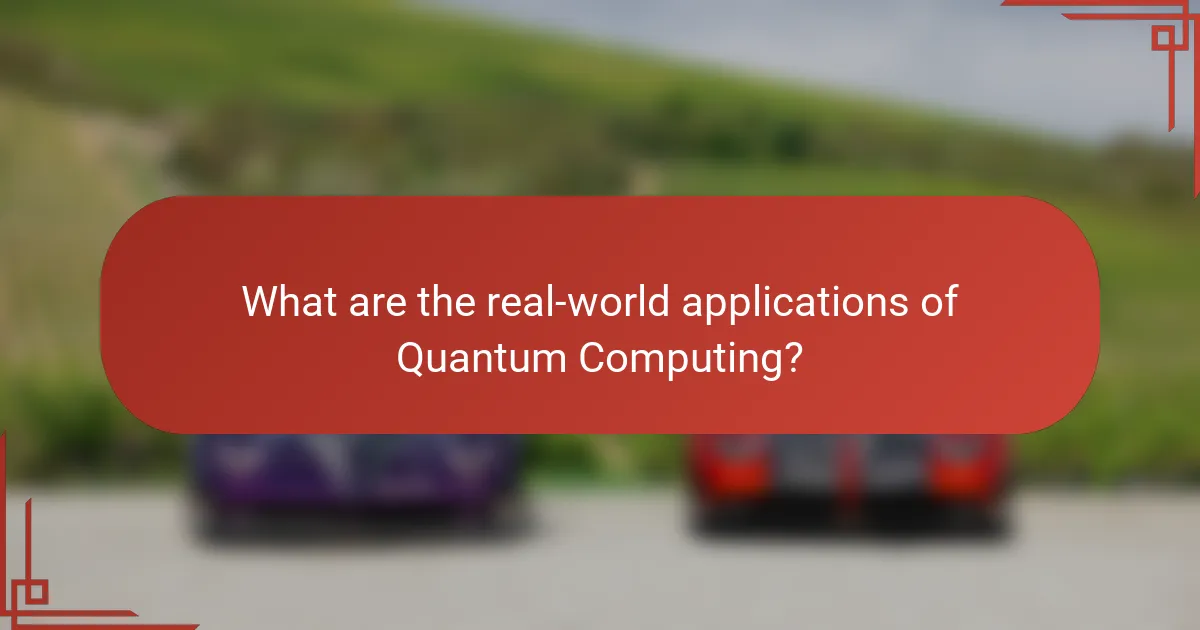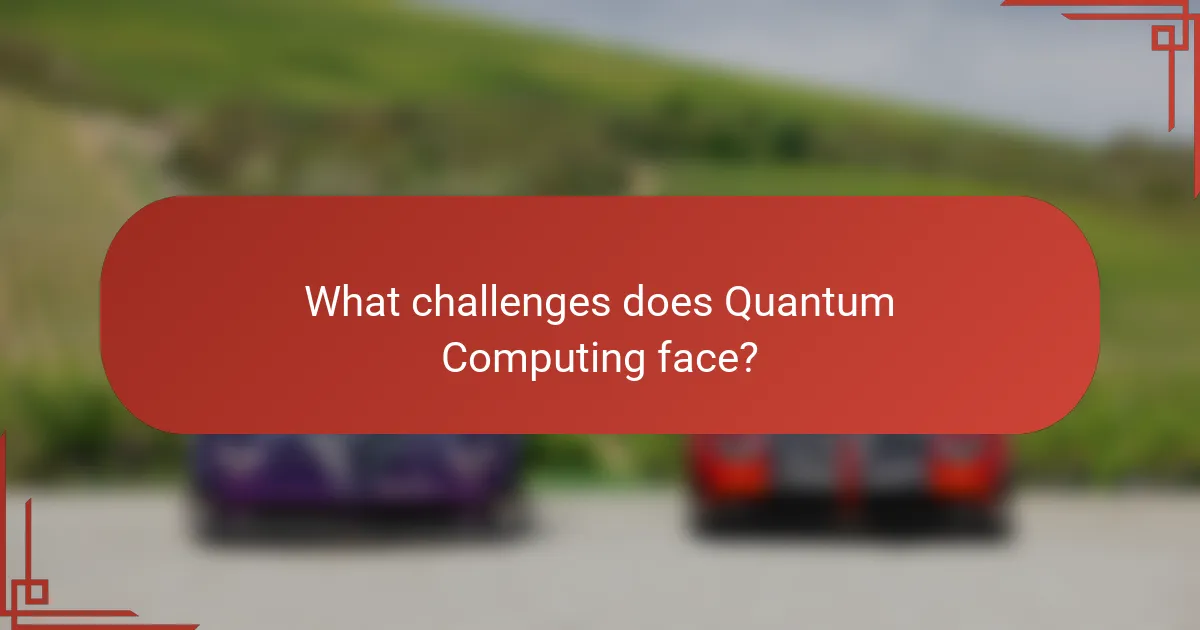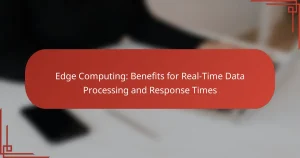Quantum computing represents a revolutionary advancement in computation, utilizing quantum bits, or qubits, which can exist in multiple states simultaneously due to superposition. This unique property enables quantum computers to process vast amounts of data at unprecedented speeds, with quantum entanglement further enhancing their capabilities by linking qubits in a way that the state of one influences another. The article explores the real-world applications of quantum computing, including drug discovery, optimization, cryptography, and materials science, while also addressing significant challenges such as qubit stability, error correction, scalability, and the shortage of skilled professionals in the field. As leading companies like Google and IBM continue to push the boundaries of this technology, the potential for transformative impacts across various industries becomes increasingly apparent.

What is Quantum Computing?
Quantum computing is a type of computation that utilizes quantum bits, or qubits. Unlike classical bits, qubits can exist in multiple states simultaneously due to superposition. This allows quantum computers to process vast amounts of data at unprecedented speeds. Quantum entanglement further enhances their computational power by linking qubits in a way that the state of one affects the state of another, regardless of distance. Research has shown that quantum computers can solve complex problems, such as factoring large numbers, more efficiently than classical computers. As of 2023, companies like Google and IBM are leading advancements in this field, demonstrating the potential for real-world applications in cryptography and materials science.
How does Quantum Computing differ from classical computing?
Quantum computing differs from classical computing in its fundamental operating principles. Classical computing uses bits as the smallest unit of data, represented as either 0 or 1. Quantum computing utilizes qubits, which can represent both 0 and 1 simultaneously due to superposition. This allows quantum computers to process vast amounts of data concurrently.
Additionally, quantum computing employs entanglement, a phenomenon where qubits become interconnected. Changes to one qubit can instantaneously affect another, regardless of distance. This characteristic enhances the computational power and speed of quantum systems.
Classical computers rely on sequential processing, while quantum computers can perform multiple calculations at once. Research indicates that quantum algorithms, such as Shor’s algorithm for factoring, can outperform classical algorithms significantly. For example, Shor’s algorithm can factor large numbers exponentially faster than the best-known classical algorithms.
These differences in data representation and processing capabilities position quantum computing as a groundbreaking technology with the potential to solve complex problems beyond the reach of classical computing.
What are qubits and how do they function in Quantum Computing?
Qubits are the fundamental units of information in quantum computing. Unlike classical bits, which represent either a 0 or a 1, qubits can exist in a state of superposition. This means they can represent both 0 and 1 simultaneously. Qubits also utilize entanglement, a phenomenon where the state of one qubit is directly related to another, regardless of distance. This allows quantum computers to perform complex calculations much faster than classical computers. For example, a quantum computer with just a few qubits can process an enormous amount of data simultaneously. The principles of quantum mechanics underpin the operation of qubits, enabling advanced processing capabilities.
What principles of quantum mechanics are utilized in Quantum Computing?
Quantum computing utilizes principles of superposition, entanglement, and quantum interference. Superposition allows qubits to exist in multiple states simultaneously. This capability enables quantum computers to process vast amounts of information at once. Entanglement creates a strong correlation between qubits, regardless of distance. This property enhances communication and data processing in quantum systems. Quantum interference helps to amplify correct solutions while canceling out incorrect ones. These principles collectively enable quantum computers to solve complex problems more efficiently than classical computers.
What are the key breakthroughs in Quantum Computing technology?
Key breakthroughs in Quantum Computing technology include the development of quantum supremacy, advancements in qubit coherence, and error correction methods. Quantum supremacy was achieved in 2019 when Google demonstrated that its quantum computer, Sycamore, performed a specific task faster than the best classical supercomputers. This marked a significant milestone in proving quantum computers can solve complex problems efficiently.
Advancements in qubit coherence have improved the stability and reliability of qubits, the fundamental units of quantum information. Companies like IBM and Rigetti have developed superconducting qubits that maintain coherence for longer durations. This enhances computational capabilities and reduces error rates in quantum operations.
Error correction methods have also seen significant progress. Techniques such as surface codes and concatenated codes allow quantum computers to correct errors that arise during computations. This is essential for scaling up quantum systems and ensuring accurate results.
These breakthroughs collectively advance the field of quantum computing, paving the way for real-world applications in cryptography, material science, and complex system simulations.
How has quantum entanglement advanced processing power?
Quantum entanglement has significantly advanced processing power in quantum computing. It allows qubits to exist in multiple states simultaneously, leading to exponential increases in computational capacity. This phenomenon enables quantum computers to solve complex problems much faster than classical computers. For instance, Shor’s algorithm, which factors large numbers, leverages entanglement for efficiency. Research shows that quantum entanglement can enhance algorithms for optimization and simulation tasks. This advancement is crucial for fields like cryptography and materials science, where traditional computing struggles. The ability to process vast amounts of data simultaneously is a direct result of entangled qubits. Thus, quantum entanglement is foundational to the breakthroughs in quantum processing power.
What role do quantum gates play in computational efficiency?
Quantum gates are fundamental components in quantum computing that manipulate quantum bits (qubits). They enable the execution of quantum algorithms that can solve problems more efficiently than classical algorithms. Quantum gates perform operations such as superposition and entanglement, which are essential for parallel processing. This parallelism allows quantum computers to explore multiple solutions simultaneously. For example, Shor’s algorithm, which factors large numbers, demonstrates significant speedup over classical methods. Research shows that quantum gates can perform computations in polynomial time for certain problems, while classical counterparts may require exponential time. This efficiency is a key advantage of quantum computing in fields like cryptography and optimization.

What are the real-world applications of Quantum Computing?
Quantum computing has several real-world applications. These include drug discovery, optimization problems, cryptography, and materials science. In drug discovery, quantum computers can simulate molecular interactions more efficiently than classical computers. This accelerates the identification of new pharmaceuticals. For optimization problems, quantum algorithms can solve complex logistical challenges, such as supply chain management. In cryptography, quantum computing can enhance security through quantum key distribution. This method allows for secure communication that is theoretically immune to hacking. Additionally, in materials science, quantum computing aids in the development of new materials with specific properties. These applications demonstrate the transformative potential of quantum computing across various industries.
How is Quantum Computing impacting industries like finance and healthcare?
Quantum computing is transforming industries like finance and healthcare through enhanced data processing capabilities. In finance, quantum algorithms can optimize trading strategies and risk assessments. They analyze vast datasets more efficiently than classical computers. This leads to improved decision-making and potentially higher returns on investments. In healthcare, quantum computing accelerates drug discovery and personalized medicine. It enables the simulation of molecular interactions at unprecedented speeds. For example, a study by IBM shows that quantum computing can reduce the time needed for drug discovery from years to months. These advancements highlight the significant impact of quantum computing on operational efficiency and innovation in both sectors.
What specific problems in finance can Quantum Computing solve?
Quantum computing can solve complex optimization problems in finance. It excels at portfolio optimization, enabling better asset allocation strategies. Quantum algorithms can analyze vast datasets more efficiently than classical computers. This capability leads to improved risk assessment and management. Additionally, quantum computing can enhance fraud detection systems. It can process and analyze transaction patterns at unprecedented speeds. This technology also aids in pricing complex financial derivatives accurately. Quantum simulations can model market behaviors more effectively. Overall, quantum computing addresses inefficiencies in financial modeling and data analysis.
How does Quantum Computing enhance drug discovery in healthcare?
Quantum computing enhances drug discovery in healthcare by significantly improving computational power and efficiency. It allows researchers to simulate molecular interactions at unprecedented speeds. This capability accelerates the identification of potential drug candidates. Quantum algorithms can analyze complex biological systems more effectively than classical computers. For example, a study by Google demonstrated that quantum computers could solve optimization problems related to drug design faster than traditional methods. This leads to reduced time and costs in the drug development process. Additionally, quantum computing can help predict the efficacy and safety of new drugs through advanced modeling techniques. Overall, its ability to process vast amounts of data transforms the landscape of drug discovery.
What are the potential benefits of Quantum Computing for society?
Quantum computing has the potential to significantly benefit society in various ways. It can solve complex problems much faster than classical computers. For example, quantum computers can optimize logistics and supply chains efficiently. This capability can lead to reduced costs and increased efficiency in industries.
Additionally, quantum computing can advance drug discovery and materials science. It allows for simulation of molecular interactions at an unprecedented scale. This can accelerate the development of new pharmaceuticals. It can also lead to breakthroughs in renewable energy technologies.
Moreover, quantum computing enhances cybersecurity. It can create more secure communication methods through quantum encryption. This protects sensitive information from cyber threats.
In finance, quantum computing can improve risk analysis and portfolio management. It enables faster processing of vast amounts of data.
Overall, the societal benefits of quantum computing include improved efficiency, accelerated innovation, enhanced security, and advancements in various fields.
How can Quantum Computing improve data security and encryption?
Quantum computing can significantly enhance data security and encryption through advanced algorithms. These algorithms, such as Shor’s algorithm, can factor large numbers exponentially faster than classical computers. This capability threatens traditional encryption methods like RSA. Quantum key distribution (QKD) provides a method for secure communication. It uses quantum mechanics to ensure that any eavesdropping is detectable. Quantum entanglement allows for the creation of secure keys that cannot be intercepted. Research shows that quantum-resistant algorithms are being developed to safeguard data against future quantum attacks. These advancements indicate a transformative shift in data security and encryption practices.
What advancements in artificial intelligence can be achieved through Quantum Computing?
Quantum computing can significantly enhance artificial intelligence capabilities. It enables faster data processing and complex problem-solving. Quantum algorithms can optimize machine learning models more efficiently than classical methods. Quantum computing also facilitates better simulations for training AI systems. It can manage vast datasets, improving pattern recognition. Additionally, quantum computing can enhance natural language processing tasks. This technology may lead to breakthroughs in AI applications such as drug discovery and climate modeling. Overall, the integration of quantum computing into AI presents transformative potential for various industries.

What challenges does Quantum Computing face?
Quantum computing faces several significant challenges. One major challenge is qubit stability. Qubits are highly sensitive to environmental noise, leading to errors in calculations. This instability affects the reliability of quantum operations. Another challenge is error correction. Quantum error correction requires a large number of physical qubits to accurately represent a smaller number of logical qubits. This increases the complexity of quantum systems.
Scalability is also a concern. Current quantum computers have a limited number of qubits, hindering their ability to solve larger problems. Additionally, developing effective quantum algorithms remains a challenge. Many existing algorithms do not fully exploit quantum capabilities.
Lastly, there is a lack of skilled professionals in the field. The workforce needs more experts in quantum mechanics and computer science to advance the technology. These challenges hinder the progress of quantum computing and its potential applications.
What are the current limitations of Quantum Computing technology?
Current limitations of quantum computing technology include issues related to qubit coherence, error rates, and scalability. Qubit coherence refers to the time a qubit can maintain its quantum state. This time is often very short, typically in the range of microseconds to milliseconds. High error rates occur due to environmental noise and imperfections in quantum gates. These errors can significantly impact the reliability of quantum computations. Scalability is another major challenge. Current quantum systems can only support a limited number of qubits, often below 100. This restricts the complexity of problems that can be effectively solved. Additionally, quantum algorithms are still in development, and many practical applications remain theoretical. Overall, these limitations hinder the widespread adoption and effectiveness of quantum computing in real-world scenarios.
How does error correction affect Quantum Computing performance?
Error correction significantly enhances quantum computing performance. Quantum systems are inherently prone to errors due to decoherence and noise. Error correction techniques help maintain the integrity of quantum information. These techniques allow for the detection and correction of errors without measuring the quantum state directly. Implementing error correction increases the reliability of quantum computations. Research shows that error-corrected quantum bits (qubits) can outperform non-corrected qubits in practical applications. For instance, studies indicate that error correction can improve the fault tolerance of quantum algorithms. This leads to more accurate results in complex computations. Therefore, effective error correction is crucial for the advancement of quantum computing technology.
What are the scalability issues associated with Quantum Computing?
Scalability issues in quantum computing primarily stem from qubit coherence and error rates. Qubits are sensitive to their environment, leading to decoherence. This limits the time they can maintain quantum states. Additionally, error rates in quantum operations are currently high. This necessitates error correction methods, which require additional qubits. As systems scale, maintaining coherence becomes increasingly challenging. The complexity of quantum circuits also grows with more qubits. This leads to difficulties in controlling and measuring qubits accurately. Current quantum computers struggle to implement large-scale algorithms effectively. Thus, scalability remains a significant hurdle in advancing quantum computing technology.
What steps are being taken to overcome these challenges?
Researchers are developing error correction techniques to enhance quantum computing reliability. These methods aim to address the issue of qubit errors during computation. Significant advancements include the implementation of surface codes and concatenated codes. These techniques allow for the correction of multiple qubit errors simultaneously.
Additionally, companies are investing in hybrid quantum-classical algorithms. This approach combines classical computing strengths with quantum capabilities. It helps in tackling complex problems that are currently unsolvable.
Furthermore, increased collaboration among academia, industry, and government is fostering innovation. Initiatives like the Quantum Economic Development Consortium are promoting shared resources and knowledge. These collaborative efforts are essential for accelerating quantum technology development.
Lastly, advancements in qubit technology, such as superconducting qubits and trapped ions, are being explored. These innovations aim to improve qubit coherence times and scalability. Collectively, these steps are crucial in overcoming the challenges faced in quantum computing.
How are researchers addressing the issue of qubit coherence?
Researchers are addressing the issue of qubit coherence through various techniques. One method involves improving material quality to reduce noise and decoherence. For instance, using superconducting materials can enhance coherence times significantly. Another approach is implementing error correction codes, which help maintain qubit states during computations. Techniques such as dynamical decoupling also play a role in mitigating environmental disturbances. Additionally, researchers are exploring different qubit architectures, like topological qubits, which are inherently more stable. Recent studies have shown that these innovations can lead to coherence times exceeding 100 microseconds in certain systems.
What innovations are being developed to improve Quantum Computing infrastructure?
Innovations in Quantum Computing infrastructure include advancements in error correction techniques. These techniques enhance qubit stability and reduce noise. Improved qubit designs, such as topological qubits, are being explored. They promise increased resilience against errors. Researchers are also developing more efficient cooling systems. These systems are crucial for maintaining qubit performance. Additionally, scalable quantum architectures are being designed. They aim to increase the number of qubits in a system. Integration of quantum and classical computing resources is also progressing. This integration facilitates hybrid computing solutions. These innovations collectively aim to enhance the overall performance and reliability of quantum computing systems.
What should businesses consider when adopting Quantum Computing?
Businesses should consider several key factors when adopting quantum computing. First, they need to assess their specific computational needs. Quantum computing excels in complex problem-solving, which may not be relevant for all businesses. Second, businesses should evaluate the current state of quantum technology. As of 2023, quantum computers are still in developmental stages and may not be ready for widespread commercial use.
Third, they must consider the required expertise. Quantum computing requires specialized knowledge that is currently scarce. Hiring or training personnel in quantum algorithms and hardware is essential. Fourth, businesses should analyze the potential return on investment. The costs of quantum technology can be high, and benefits may take time to materialize.
Fifth, companies need to stay informed about regulatory frameworks. Quantum computing raises new ethical and security concerns that may necessitate compliance with evolving regulations. Lastly, partnerships with research institutions or tech companies can facilitate access to resources and expertise. Collaborations can enhance innovation and accelerate the adoption process.
Quantum computing is a revolutionary technology that leverages quantum bits (qubits) to perform complex computations at unprecedented speeds. This article explores the fundamental differences between quantum and classical computing, highlighting key principles such as superposition and entanglement that enhance processing power. It also discusses significant breakthroughs in the field, including advancements in qubit coherence and error correction, as well as real-world applications in sectors like finance and healthcare. Additionally, the article addresses the challenges facing quantum computing, such as scalability and qubit stability, while outlining ongoing innovations aimed at overcoming these obstacles.


